Into the Unknown, With and Without Bombs
Into the Unknown, With and Without Bombs
[Khum Saob, Cambodia on 10/13/23]
In the early 70’s, Cambodians went berserk on their Vietnamese minority. Murdering hundreds, they tossed bodies, often headless, into the Mekong. Sailing upriver to Phnom Penh, the South Vietnamese Navy brought thousands back to Vietnam, while the North Vietnamese Army also rescued a few.
Cambodians were enraged the Vietnam War had spilled into their country. With North Vietnam using a huge swath of Cambodia for its Ho Chi Minh Trail, American bombs rained down, massacring thousands of Cambodians. Cambodians had also not forgotten a third of Vietnam had once been theirs.
In Kracheh, I’ve met a 55-year-old Vietnamese who lived through all this. Selling fish, his mom was a rich merchant who fed North Vietnamese troops stationed in this area. He showed me a bridge destroyed by American bombs. When the bombardment got too intense in 1973, his family was moved by the NVA to an area near Tay Ninh, South Vietnam, that it controlled.
“My mother had four or five kilograms of gold, but these were lost in a fire a few years later.”
“You got all the way back to Vietnam, the hard part, only to lose this gold! How did this happen?”
“Somebody was making bánh chưng. When a fire started, we had to run!”
“So you lost everything!”
“We lost everything. I’d be doing fine otherwise.”
As is, he’s making a few bucks a day as a motorbike taxi guy. Just after 4AM each day, he appears at the same corner opposite the central market. Strolling by in the dark at 5:15AM, I heard him listening to the news in Vietnamese. That’s how we met.
“So what year did you get back to Cambodia?”
“1982.”
“When the Khmer Rouge was still in power.”
“Not here. Our soldiers were here.”
“Why did you leave Vietnam?”
“I didn’t want to be drafted!”
“To fight in Cambodia!”
“I didn’t want to be killed.”
“We still don’t know how many Vietnamese were killed here.”
Each night, they heard Vietnamese artillery striking the Khmer Rouge across the Mekong. There was no electricity. With oil lamps extinguished, all of Kracheh was dark.
“Did the Khmer Rouge make it over the river?” I asked.
“They never did.” Crossing by boats, they would have been slow moving targets.
Though his name is Triệu, he’s called “Cu,” a nickname usually reserved for small boys. It means “Penis.” Another grown Vietnamese here is called “Tèo,” also a goofy name meant for kids.
Today, there are a few hundreds Vietnamese in Kracheh. Citizens of neither Vietnam nor Cambodia, they are stateless. It doesn’t matter if they’re born here. Cu has a Cambodian daughter-in-law, however, so his grandkids will be Cambodians, at last. Outside the West, citizenship is usually defined by blood.
Stateless, you have no passport, so can’t go anywhere. Gazans are like that. At least the Vietnamese in Cambodia don’t have to worry about being wiped out en masse. Just surviving day to day is enough of a challenge.
Outside Phom Penh, Vietnamese in Cambodia keep a low profile. In Akreiy Ksatr five years ago, I encountered a woman who couldn’t look more Vietnamese, and she was also making a Viet dish, bánh xèo. Still, she refused to speak Vietnamese to me. Looking alarmed, she just wanted me to scram.
Before dawn last Friday, I told Cu, “Today, I will go to the sticks.”
“Why?”
“I want to see a village.”
“There’s nothing there! The food will be awful, and there all are these losers and desperate drug addicts who will suddenly notice you, a rich foreigner!”
“I already told this Cambodian guy I’ll go with him.”
“You can change your mind!”
Laughing, I replied, “If you don’t see me in two days, I’m done.”
The Vietnamese expression is actually “digested” [“tiêu rồi”]. Eating is the main Viet metaphor. If you’re digested, someone has eaten you and shit you out. Back to the earth, you’re done, with even your stench disappearing presently. I stink, therefore I am, but not for long.
Sitting in a tuk-tuk dubbed “JESUS’ MOBILE,” I was taken by my hotel receptionist, Louy, to his village. Each month, Louy usually gets two days off, but this time, it will be four. With even richer countries going broke, there are fewer tourists at Heng Heng Hotel. Its location is great, the room is fine and the price unbeatable. Just don’t count on reliable wifi.
Thirty-five years old, Louy is married, with three kids, with the oldest just six years old. Five years ago, Louy borrowed $10,000 from a bank, a decision he’s starting to regret. Louy has a plot of land worth $30,000, if it can ever be sold. Five tethered cows are left there to eat as much grass as they want. In his 20’s, Louy went to Phnom Penh, but he bounced right back after only a month.
Since Louy’s English is poor, I always speak to him very slowly, with each word clearly pronounced. Hearing his “rye,” I correct it to “rice,” and his “doctor” to “daughter,” etc. Listen to the news in English, I advised, since newscasters speak most clearly. It doesn’t appear Louy pays attention to news in any language. When I mentioned the war in Israel, Louy had no idea what I was talking about.
Paying $20, I got two nights on the thinest mattress in a room shared with four of Louy’s relatives. My red bedsheet had pink and blue flowers, with “LOVE” at intervals. To make sure I wouldn’t pull out, Louy was vague about the details, but everything worked out fine, for I got a glimpse into a Cambodia almost never seen by outsiders.
Getting off the ferry, I could tell we had entered a poorer country, with the houses more rudimentary the further we went. In construction and proportion, some were quite handsome, However. Some crude ones had for their only decorative touch some festive cloth crowning their entrance. Over two days, I spent nearly all my waking hours walking up and down a dirt road, with all eyes on me. Locals were naturally curious.
Wooden houses were raised on beams, with huge overhanging roofs, so lots of shade was provided. What’s beneath each house was effectively another floor, where hammocks could be slung, a kitchen placed or animals kept. Dogs barked but didn’t bite. Twice, though, I had to pick up a large rock and assume a fierce face. Chickens crossed the road. Ducks, too, but I didn’t spot many.
Large framed pictures often faced the road. Some depicted a landscape or fish. As with aquariums at the front of Chinese restaurants, swimming fish symbolize circulation, as in money flowing in, and out, too, since you must spend money to make it. Most often, though, the images were of a bride and groom, since these are the most beautiful portraits Cambodians will receive during their lifetime. It’s unlikely they’ll ever be as proud, happy and relieved.
One American I know walked out of her wedding, though, and she kept going until, miles away, she used a payphone to call someone to bring her back. Needless to say, her marriage didn’t last.
I passed a six year old girl carrying a bottle of soy sauce in a plastic bag, and in her right hand, she clutched rolled up money. Learning how to be responsible, she also wore a pink watch. Her cherry red and turquoise blue outfit had red haired, blue eyed fairies and smiling clouds.
At a roadside snack stand, a teenage girl had enough English to ask where I was from. Candidly, I admitted, “Vietnam,” with the qualification I had spent decades in the USA. I had to add this to explain my English.
In Beirut in 2020, I was warned to not stray into Sabra, an impoverished neighborhood populated by Palestinian refugees. Of course, I went there.
Spotting me, a young man shouted from afar, “What is your name? Where are you from? I love you!”
“Vietnam!” I answered, without the USA bit.
As I write, Uncle Sam is sending warships to support genocidal Jews in their quest to massacre more Palestinians. There is no ancient feud. Before the founding of Israel, Jews had peaceful lives and huge synagogues in Arab countries. I saw a couple in Cairo.
Hearing I was Vietnamese, the Cambodian girl’s expression didn’t change. From her, I bought five baluts over two days. These boiled duck embryos didn’t spike my blood sugar, so were safe to eat. All her siblings liked me. A boy wore a black shirt with white lettering, like a huge necklace, “BE NICE.” Her puppy slept in the dirt at my feet.
Actually, one baby girl was alarmed at my presence. Her slightly crooked mouth conveyed deep concern. What is this white haired weirdo up to? Even more than the adults, she could tell I was foreign. Smiling, I put out my arms, which brought terror to her face. Everyone laughed.
In Hongcheon, South Korea, you can pay $90 a day to stay in a mock prison. Free of the TV, cellphone, conversations or even a mirror, you can give your stressed brain a rest. Staying in Preaek Prasab for two nights, I wasn’t subjected to any bizarre privation, but without wifi or a common language with others, my world also became quieter and less cluttered.
To tell my hosts I was about to sleep, I placed my hands, palm to palm, to the side of my tilted head and closed my eyes. Making circular motions on my belly meant I wasn’t hungry.
Lying in the dark, I could hear crickets and, occasionally, cocks crowing, for they do this through the night, not just at dawn. Before 5AM on my first night, I also heard a male and female voice in prayer, then men chanting, with bits of xylophone in accompaniment. These appeals and thanks to the heavens lasted over an hour.
By 6AM, I was roaming around to find hot coffee, but there was none, not then or later. In Preaek Prasab, only iced coffee is available, and if you order noodles at the rarest joint with a table, you’re likely to get the instant variety. In spartan stores, there are no cookies for the skinny children. Playing with next to nothing, they still laugh.
My reader Elenka puts it best, “What I can’t get over is how peaceful and calm and handsome the people are in your photographs. They have none of the pinched anxiety on the faces of Americans. They are not snarling or whimpering. They don’t have the look of lost souls. They know who they are and where they belong. The pictures you post I look at every day. They give me both pleasure and hope. These people, who I will never know or meet, have a dignity that feeds my soul.”
[Preaek Prasab, Cambodia on 10/14/23]
[Preaek Prasab, 10/14/23]
[Kampi, Cambodia on 10/15/23]
[Khum Saob, 10/13/23]
[Preaek Prasab, 10/14/23]
Source: Postcards from the End
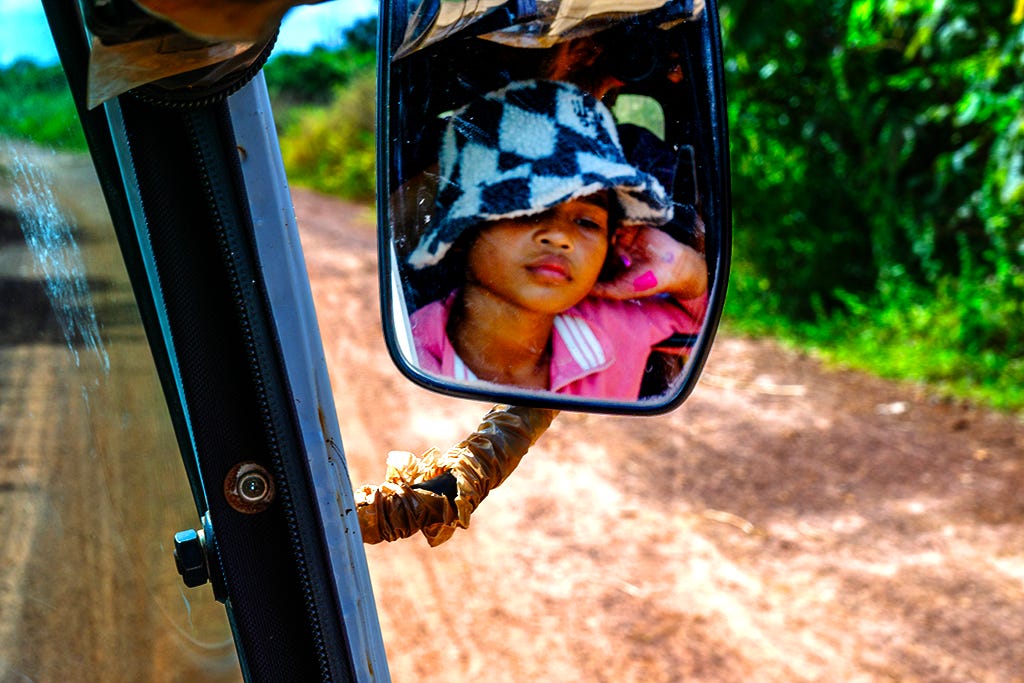
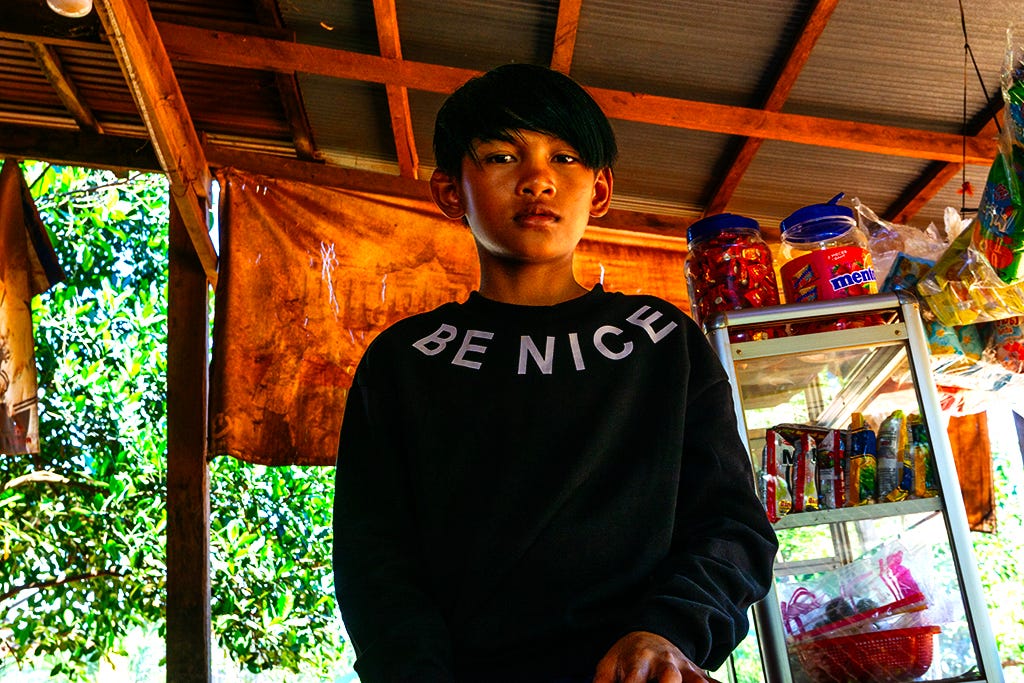
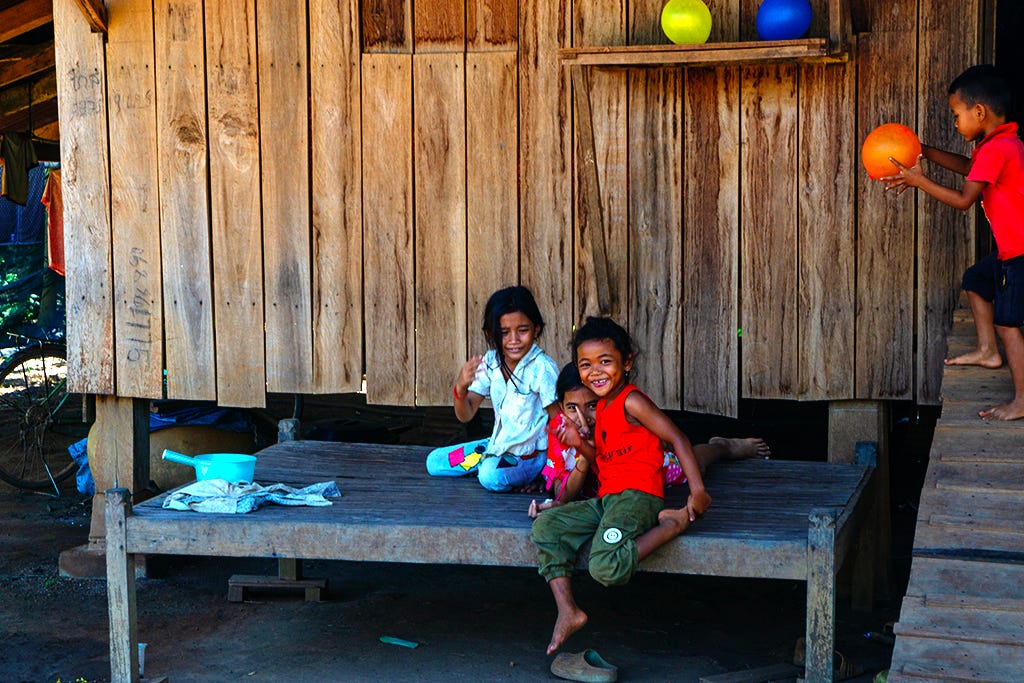
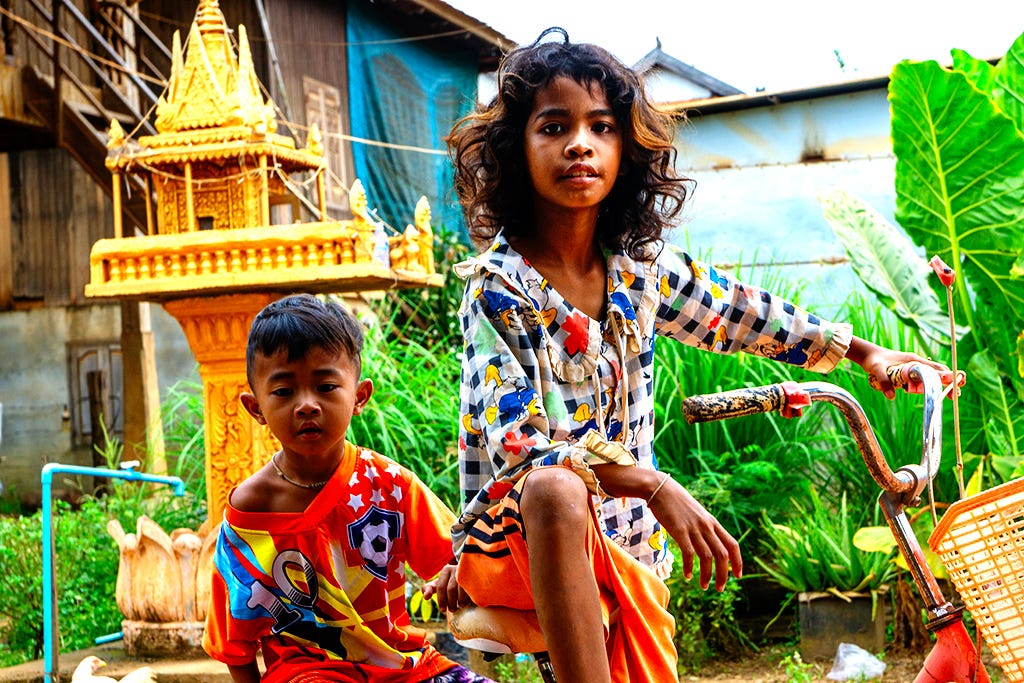
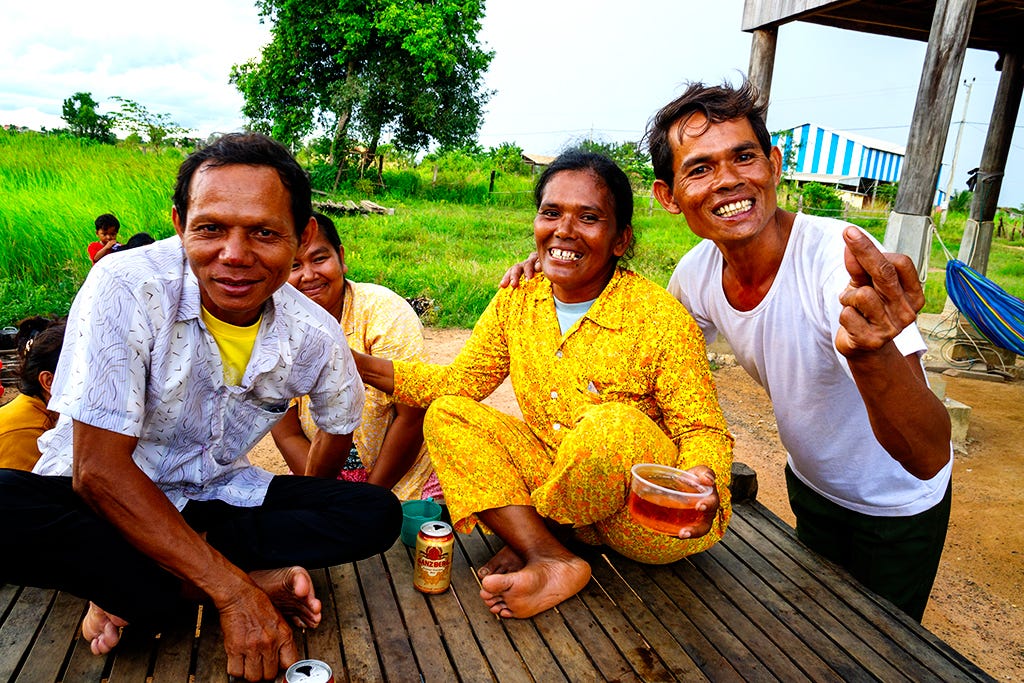
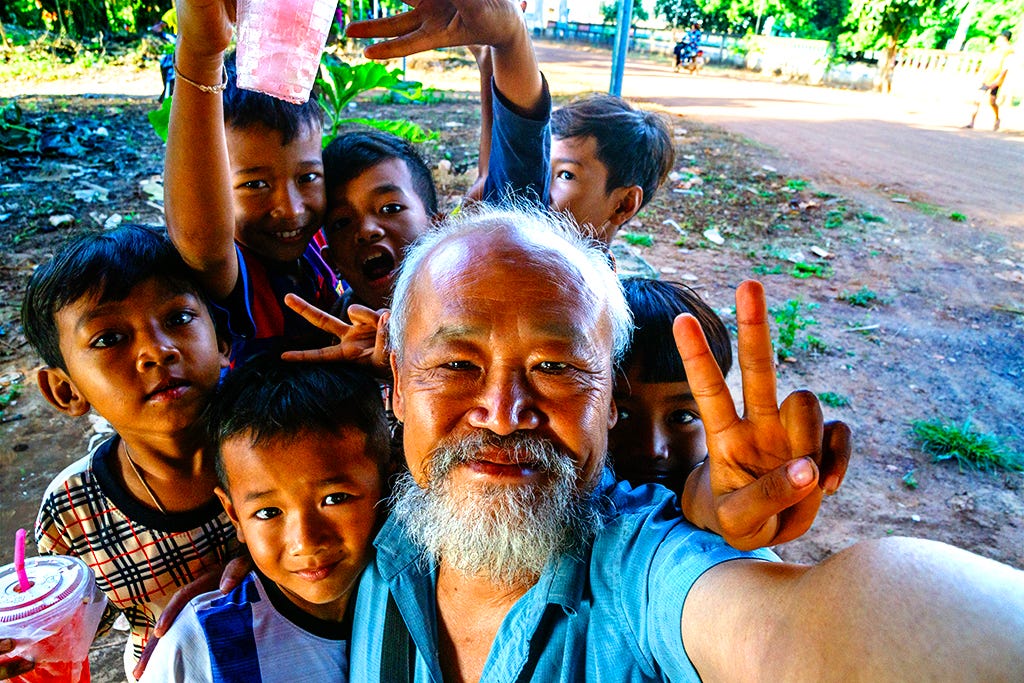
Comments
Post a Comment